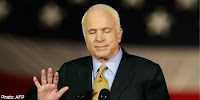
Well, someone had to do it. Someone had to finally get people out and Ba-Rock the Vote, as so many inept politicians before had attempted in the decades prior to 2008. The victory was clear, decisive, and wildly popular: Barack Obama is to become the 44th president of the United States. The fanfare associated with the inception of the very first African-American president is not only appropriate, but required.
But the roads will not prove to be so golden along the way in the next four years.
And while certainly challenging, Obama will have to do less of the talking which makes him so appealing and more of the walking that he has promised his country he would do, without having demonstrated a lot of it in his prior experiences. But no one will have more power than he to squeeze every drop of potential out of his administration.
So for better or for worse, these next four years are all Obama's to make or break. And if there's less making than breaking, the fault cannot be laid at the feet of outgoing President Bush.

Granted, Obama is inheriting an unprecedented burden. Two wars with one over-arching theme of eliminating terrorism coupled with an economy that seems to be "inconsistent" at best would be a challenge for anyone. But blaming the previous administration for one's woes is worthless. It gets nothing positive done but it is also, frankly, something that Bush did to absolutely no avail. Bush lamented the Clinton administration for a majority of his initial hiccups, and went about scrapping everything that Clinton hadn't nailed down in his eight years.
And look where that got Bush. Bush eliminated every stick of infrastructure of the executive branch prior to his arrival and I would argue thusly struggled. The Obama camp currently has plans to do this, or so I hear and speculate, but were I an adviser, I might hold off. It's just weak sauce.
Obama is a powerful personality. But a majority of his power does not lie in that trademark grin of his, or his oratory skills, but rather his control of both the House and the Senate. Obama has two of the three branches of government in the palm of his hand. It should be mentioned that Bush also had party favoritism when he was elected, as well as six years of his eight year tenure.
 But the division in Congress was much more even, so a GOP-romp was impossible whereas a Democratic free-for-all is a very real possibility.
But the division in Congress was much more even, so a GOP-romp was impossible whereas a Democratic free-for-all is a very real possibility.Those recounts and run-off elections? Like Al Franken's in Minnesota? Those do matter, because Democrats are very nearly close to a filibuster-proof legislative period that would allow for most of their bills to pass unscathed, unopposed, and unchecked by the right. Now the past two elections have certainly been a mandate by the public for more Democratic legislation, but there needs to be some sort of disparity, some sort of discourse between parties. This is still a center-right country, and if Obama thinks that he can use majority rule tactics, he will most likely be treated similarly to Clinton in 1994 and Bush in 2006, both mid-term election domination by the opposing party.
Obama has an opportunity to be a transformational president, if only he follows through with the assurances he gave on his campaign stumps. I noticed a bit of his acceptance speech on Nov. 4th, something that makes me take notice, wary against a preceding-president backlash I see on the horizon:
The road ahead will be long. Our climb will be steep. We may not get there in one year or even in one term. But, America, I have never been more hopeful than I am tonight that we will get there. -Barack Obama
The tail end of his message spells hope, while the first spells out "get out of jail free," or a "rebuilding year," to use a sports phrase.
 And I certainly agree with that. However, I believe that whether or not his first term is a success lies on his shoulders, rather than on Bush's.
And I certainly agree with that. However, I believe that whether or not his first term is a success lies on his shoulders, rather than on Bush's.Call this what you will, but I'll call it a preemptive attack on using a weak previous leader as a crutch. The end result would just be that: weak.




































